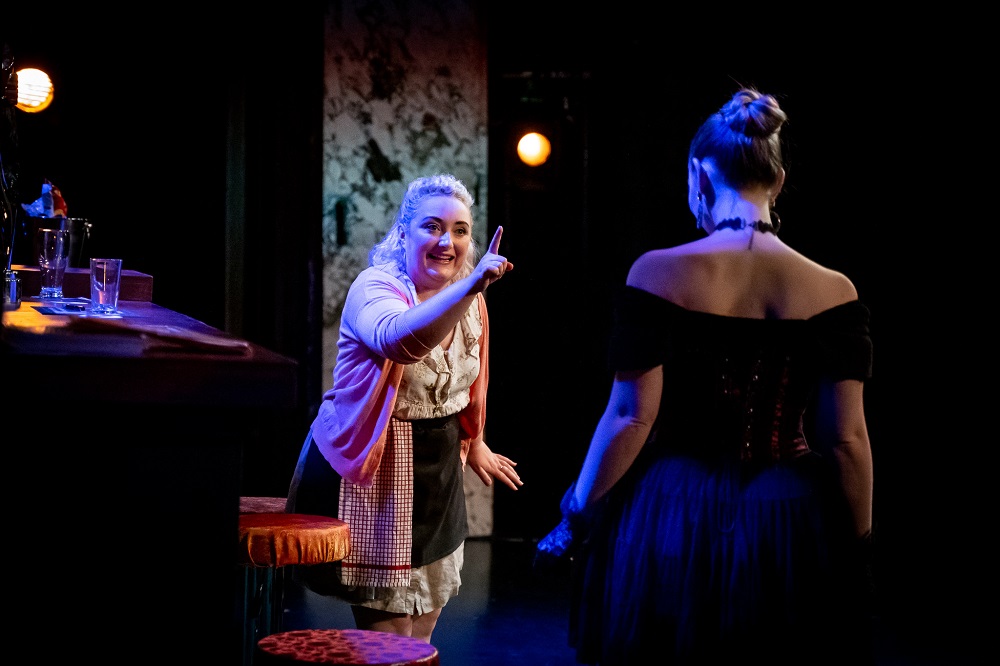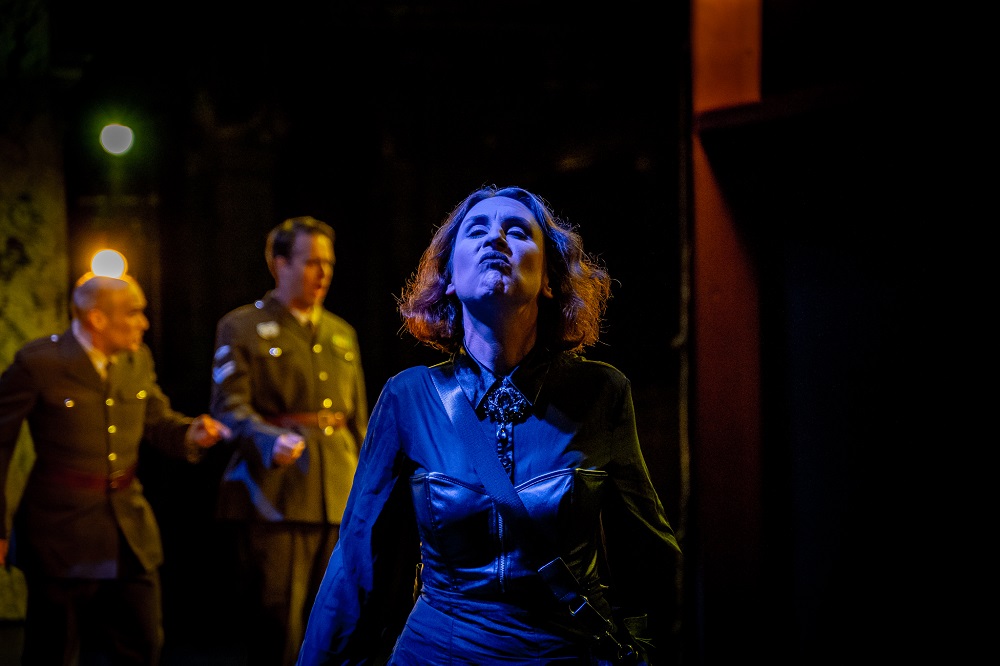Patience, Charles Court Opera, Wilton's Music Hall review - bar room bliss | reviews, news & interviews
Patience, Charles Court Opera, Wilton's Music Hall review - bar room bliss
Patience, Charles Court Opera, Wilton's Music Hall review - bar room bliss
Perfect cast of nine delivers big laughs and fair share of vocal glamour
“Twenty lovesick maidens we,” pining in stained-glass attitudes for florid poet Reginald Bunthorne, usually kick off Gilbert and Sullivan’s delicious mockery of the high (or cod) aesthetical. That might have been a problem for Charles Court Opera’s total cast of nine. Not so: the lights go up on three “melancholy”, Goth-sh maybe not-quite-“maidens", knocking it back at the bar of the Castle Inn, and we know we’re in the best of hands. The delight is unmodified over the next two hours.
That includes the late replacement for the lead sham-aesthete; Matthew Kellett was ill, and while we wish him well, there was undisguised delight that today’s infallible high priest of Savoyard style, the show’s director John Savournin, was the one to take up the poses. I anticipated that it might be a bit like a revelatory evening at the café-theatre of Katoomba in Australia’s Blue Mountains, where the stage manager stepped in to the lead role for Summer of the Seventeenth Doll and wowed us all, even with script in hand. Savournin needed no script, other than Bunthorne’s book of poetic musings for the third verse of his Act One solo, where lines had been modified to turn the lily-lover into a more modern would-be philosopher.
Oozing on with kohl-rimmed eyes and projecting invertebrate languor - inevitably there are no photos as yet - Savournin didn’t even need to open his mouth to make us laugh. Still, Gilbert’s dazzling text got extra nuance throughout (like the need to consult the book for the fourth word of Bunthorne’s masterly poem “Oh, Hollow! Hollow! Hollow!"), The beauty of his casting and directing is that everyone else came up to his mark in one way or another.  There was special vocal glamour from super-musical soprano Catriona Hewitson’s Patience (pictured above with Meriel Cunningham's Lady Angela) - a barmaid, not a milkmaid, which works fine despite Grosvenor's "The Magnet and the Churn" losing a bit of relevance; from the perfect G&S tenor David Menezes as Lieutenant the Duke of Dunstable of the Dragoon Guards; and from Matthew Siveter playing up poet-rival Archibald Grosvenor as ardent baritone (the face made for comedy actually made the lines about being beauteous all the funnier). Our three Bunthorne groupies were perfect, too: Meriel Cunningham's Lady Angela and Jennie Jacobs' Lady Saphir glamorous in their get-up, razor-sharp funny in their delivery, Catrine Kirkman as Lady Jane (pictured below with Menezes and Matthew Palmer as Colonel Calverley) living up to the comic genius of her chav Plaintiff in the CCO Trial by Jury (where Savournin appeared as a Judge Judy of sorts) with a plausible characterisation of an older hipster, knowing where to modify the mockery,
There was special vocal glamour from super-musical soprano Catriona Hewitson’s Patience (pictured above with Meriel Cunningham's Lady Angela) - a barmaid, not a milkmaid, which works fine despite Grosvenor's "The Magnet and the Churn" losing a bit of relevance; from the perfect G&S tenor David Menezes as Lieutenant the Duke of Dunstable of the Dragoon Guards; and from Matthew Siveter playing up poet-rival Archibald Grosvenor as ardent baritone (the face made for comedy actually made the lines about being beauteous all the funnier). Our three Bunthorne groupies were perfect, too: Meriel Cunningham's Lady Angela and Jennie Jacobs' Lady Saphir glamorous in their get-up, razor-sharp funny in their delivery, Catrine Kirkman as Lady Jane (pictured below with Menezes and Matthew Palmer as Colonel Calverley) living up to the comic genius of her chav Plaintiff in the CCO Trial by Jury (where Savournin appeared as a Judge Judy of sorts) with a plausible characterisation of an older hipster, knowing where to modify the mockery,
Of course one missed the double-bass Jane tries to master at the beginning of Act Two; memories of Felicity Palmer actually playing it in a vintage Prom conducted by Charles Mackerras are indelible. Even so, “Silvered is the Raven Hair” saw a plausible and still-funny approach to Gilbert’s tricky let’s-laugh-at-the-past-it-dame habit. And music director David Eaton's tireless artistry at the piano made one miss the orchestra less than usual, with chamber-musical gains.  With no chorus, the nonet sometimes made it feel like Così-plus. The virtuoso Act One double chorus had special sharpness, and what beauty in the wistful ensemble of short-lived contentment which gives the Act 1 finale a much-needed gilding along the lines of “Hail, Poetry!” in The Pirates of Penzance. And the updating works. Whenever anyone asks “which is the best Savoy opera?”, the answer has to be “the one I’ve seen most recently”. And Patience’s special claim rests with the unbridled vivacity of three Act Two numbers – two duets (Bunthorne/Jane, later Bunthorne/Grosvenor) and the joyous partner-swapping Quintet which also provides the perfect curtain-music. Yet it’s easy to trip up with too much camp or sloppy movement; Savournin’s work in the skill of the reimagining and the projection of the text is perfection itself. You won't see a better opera/operetta production this year.
With no chorus, the nonet sometimes made it feel like Così-plus. The virtuoso Act One double chorus had special sharpness, and what beauty in the wistful ensemble of short-lived contentment which gives the Act 1 finale a much-needed gilding along the lines of “Hail, Poetry!” in The Pirates of Penzance. And the updating works. Whenever anyone asks “which is the best Savoy opera?”, the answer has to be “the one I’ve seen most recently”. And Patience’s special claim rests with the unbridled vivacity of three Act Two numbers – two duets (Bunthorne/Jane, later Bunthorne/Grosvenor) and the joyous partner-swapping Quintet which also provides the perfect curtain-music. Yet it’s easy to trip up with too much camp or sloppy movement; Savournin’s work in the skill of the reimagining and the projection of the text is perfection itself. You won't see a better opera/operetta production this year.
rating
Explore topics
Share this article
The future of Arts Journalism
You can stop theartsdesk.com closing!
We urgently need financing to survive. Our fundraising drive has thus far raised £49,000 but we need to reach £100,000 or we will be forced to close. Please contribute here: https://gofund.me/c3f6033d
And if you can forward this information to anyone who might assist, we’d be grateful.

Subscribe to theartsdesk.com
Thank you for continuing to read our work on theartsdesk.com. For unlimited access to every article in its entirety, including our archive of more than 15,000 pieces, we're asking for £5 per month or £40 per year. We feel it's a very good deal, and hope you do too.
To take a subscription now simply click here.
And if you're looking for that extra gift for a friend or family member, why not treat them to a theartsdesk.com gift subscription?
more Opera
 Hamlet, Buxton International Festival review - how to re-imagine re-imagined Shakespeare
Music comes first in very 19th century, very Romantic, very French operatic creation
Hamlet, Buxton International Festival review - how to re-imagine re-imagined Shakespeare
Music comes first in very 19th century, very Romantic, very French operatic creation
 Falstaff, Glyndebourne review - knockabout and nostalgia in postwar Windsor
A fat knight to remember, and snappy stagecraft, overcome some tedious waits
Falstaff, Glyndebourne review - knockabout and nostalgia in postwar Windsor
A fat knight to remember, and snappy stagecraft, overcome some tedious waits
 Salome, LSO, Pappano, Barbican review - a partnership in a million
Asmik Grigorian is vocal perfection in league with a great conductor and orchestra
Salome, LSO, Pappano, Barbican review - a partnership in a million
Asmik Grigorian is vocal perfection in league with a great conductor and orchestra
 Semele, Royal Opera review - unholy smoke
Style comes and goes in a justifiably dark treatment of Handelian myth
Semele, Royal Opera review - unholy smoke
Style comes and goes in a justifiably dark treatment of Handelian myth
 Le nozze di Figaro, Glyndebourne review - perceptive humanity in period setting
Mostly glorious cast, sharp ideas, fussy conducting
Le nozze di Figaro, Glyndebourne review - perceptive humanity in period setting
Mostly glorious cast, sharp ideas, fussy conducting
 Fidelio, Garsington Opera review - a battle of sunshine and shadows
Intimacy yields to spectacle as Beethoven's light of freedom triumphs
Fidelio, Garsington Opera review - a battle of sunshine and shadows
Intimacy yields to spectacle as Beethoven's light of freedom triumphs
 Dangerous Matter, RNCM, Manchester review - opera meets science in an 18th century tale
Big doses of history and didaction are injected into 50 minutes of music theatre
Dangerous Matter, RNCM, Manchester review - opera meets science in an 18th century tale
Big doses of history and didaction are injected into 50 minutes of music theatre
 Mazeppa, Grange Park Opera review - a gripping reassessment
Unbalanced drama with a powerful core, uninhibitedly staged
Mazeppa, Grange Park Opera review - a gripping reassessment
Unbalanced drama with a powerful core, uninhibitedly staged
 Saul, Glyndebourne review - playful, visually ravishing descent into darkness
Ten years after it first opened Barrie Kosky's production still packs a hefty punch
Saul, Glyndebourne review - playful, visually ravishing descent into darkness
Ten years after it first opened Barrie Kosky's production still packs a hefty punch
 Così fan tutte, Nevill Holt Festival/Opera North review - re-writing the script
Real feeling turns the tables on stage artifice in Mozart that charms, and moves
Così fan tutte, Nevill Holt Festival/Opera North review - re-writing the script
Real feeling turns the tables on stage artifice in Mozart that charms, and moves
 La Straniera, Chelsea Opera Group, Barlow, Cadogan Hall review - diva power saves minor Bellini
Australian soprano Helena Dix is honoured by fine fellow singers, but not her conductor
La Straniera, Chelsea Opera Group, Barlow, Cadogan Hall review - diva power saves minor Bellini
Australian soprano Helena Dix is honoured by fine fellow singers, but not her conductor
 The Queen of Spades, Garsington Opera review - sonorous gliding over a heart of darkness
Striking design and clear concept, but the intensity within comes and goes
The Queen of Spades, Garsington Opera review - sonorous gliding over a heart of darkness
Striking design and clear concept, but the intensity within comes and goes

Add comment